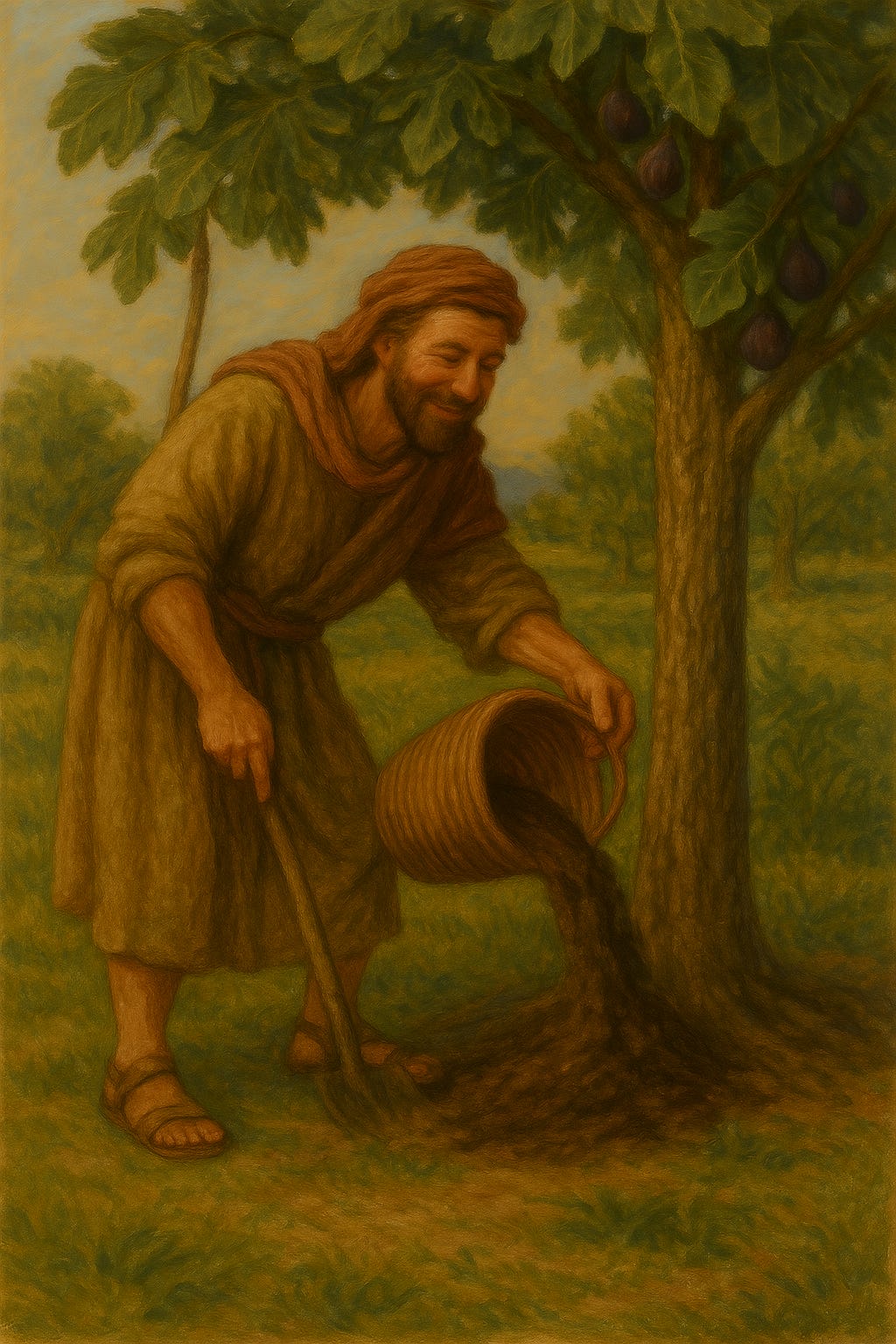From Skata to Sweetness: When Waste Becomes a Garden
Lectionary Readings – Fifth Sunday of Lent (Year C)
Isaiah 43:16–21 – “Forget the former things; do not dwell on the past. See, I am doing something new!”
Psalm 126 – “Those who sow in tears shall reap with shouts of joy.”
Philippians 3:8–14 – “I consider everything as loss… as skubalon, that I may gain Christ.” …. “Forgetting what is behind and straining toward what is ahead, I press on toward the goal to win the prize for which God has called me heavenward in Christ Jesus.”
John 8:1–11 – “Neither do I condemn you. Go, and from now on do not sin again.”
She was caught in the act. Dragged out, accused, and made into a spectacle—no defense, no appeal, just the heat of shame and the cold of judgment. The Law was clear: she should be stoned. But Jesus bends down, draws in the dirt, and says, “Let the one without sin cast the first stone.”
Silence. Then one by one, the stones fall to the ground—not in violence, but in surrender. And in a moment of pure grace, Jesus looks up and says,
“Neither do I condemn you. Go now, and sin no more.”
This is the heart of the Gospel. Not cheap forgiveness. Not tolerance. But transformation. Jesus doesn’t excuse the sin—He refuses to let it define her. What should have been a moment of death becomes the soil of new life.
We don’t know what happened next for the woman caught in adultery.
But we do know what happens when broken people encounter Jesus.
We’ve seen it before:
Mary Magdalene—delivered from torment, became the first to proclaim the risen Christ.
The Samaritan woman—five husbands behind her, became the voice that brought an entire village to meet the Messiah.
The woman who wept at His feet—known only for her sin, left known only for her love.
The woman with the issue of blood—twelve years of isolation ended with one touch, and she was called “daughter.”
The Syrophoenician woman—a Gentile outsider, who refused to walk away, and whose faith drew healing from the heart of God.
Each story tells the same truth:
When Jesus steps into a life, the past doesn’t disappear—but it’s no longer the end of the story. Shame is transformed by grace, enriching the soil of new life and bearing lasting fruit.
Paul echoes this theme in his letter to the Philippians. He lists all his past accomplishments—his heritage, his education, his zeal—and then he uses a shockingly earthy word:
“I consider them all skubalon—garbage, dung, refuse—compared to the surpassing worth of knowing Christ.”
“Forgetting what is behind and straining toward what is ahead, I press on toward the goal to win the prize for which God has called me heavenward in Christ Jesus.”
Paul doesn’t bury the past to forget it—he composts it. What once seemed like rich soil—his achievements, his pedigree, his righteousness—he now sees as rubbish, fit only to be broken down and left behind. But even rubbish has a place in growth. It becomes the decay that feeds the roots, not the fruit. The past is no longer his pride or his prison; it’s part of what nourishes the pressing on. Forgotten not because it’s erased, but because it’s been repurposed—fuel for new life. And now, all energy pushes upward, toward the light of Christ.
Isaiah says it plainly:
“Forget the former things. Do not dwell on the past. See, I am doing something new! Now it springs forth—do you not perceive it?”
Where does it spring up?
In the wilderness. In the wasteland. In the places we thought were dead and done.
Psalm 126 sings the same melody:
“Those who sow in tears shall reap with shouts of joy.”
Tears fall into soil like rain—and joy rises.
Victor Hugo understood this transformation. In Les Misérables, Jean Valjean, hardened by prison and survival, steals silver from Bishop Myriel—the one man who showed him kindness. Caught and returned to the bishop by the police, Valjean braces for punishment. But instead, the bishop says, “You forgot these,” and gives him more silver…….
Then, these life-altering words:
“With this silver I have bought your soul. I have ransomed you from fear and hatred, and now I give you back to God.”
That moment of mercy changes everything. Like the woman before Jesus, Valjean walks away not condemned, but called—to new life, new fruit, new sweetness.
Because in Christ, your past is no longer your identity. What once defined you in the flesh is buried in grace, and from that soil, your true identity begins to rise.
And from that sacred soil—redeemed, enriched, and renamed—fruitfulness grows.
Not by effort, but by abiding.
Not by proving, but by being.
A hundredfold… even a thousand.
Footnote: What Is Skubalon?
In Philippians 3:8, Paul uses the Greek word skubalon , often translated as “rubbish,” “garbage,” or “dung.” It was a strong, crude word in the ancient world, used to describe excrement, scraps, and refuse—anything repulsive and discarded.
Paul uses it to express just how little value he places on his former accomplishments compared to knowing Christ. But there’s poetic irony in the word: in agrarian life, dung becomes fertilizer. Though Paul is discarding his past, the image of waste turned into soil reminds us—God can redeem even what we throw away. In His mercy, even our skubalon becomes the beginning of something beautiful.



